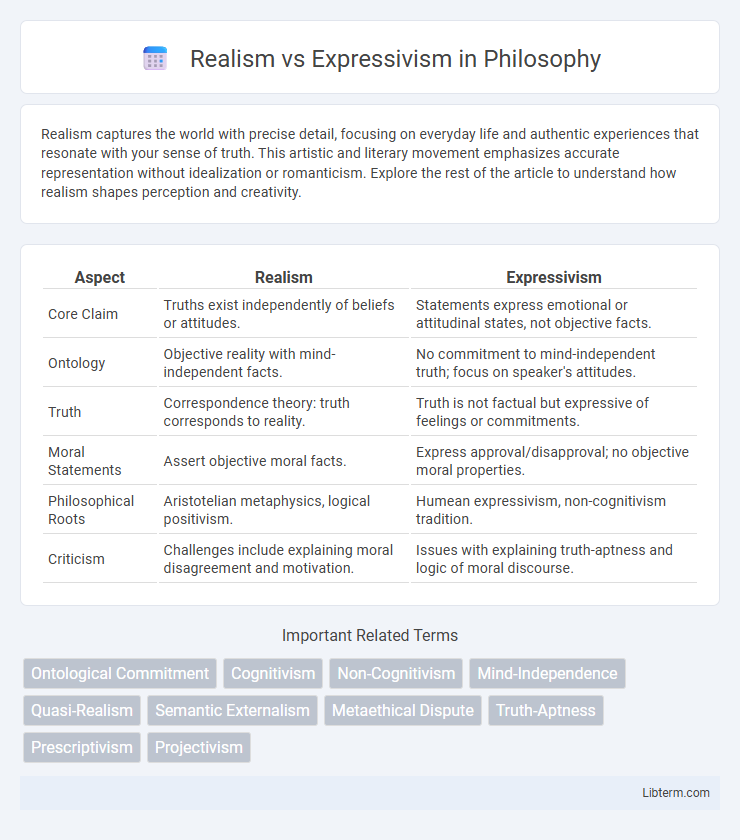Realism captures the world with precise detail, focusing on everyday life and authentic experiences that resonate with your sense of truth. This artistic and literary movement emphasizes accurate representation without idealization or romanticism. Explore the rest of the article to understand how realism shapes perception and creativity.
Table of Comparison
| Aspect | Realism | Expressivism |
|---|---|---|
| Core Claim | Truths exist independently of beliefs or attitudes. | Statements express emotional or attitudinal states, not objective facts. |
| Ontology | Objective reality with mind-independent facts. | No commitment to mind-independent truth; focus on speaker's attitudes. |
| Truth | Correspondence theory: truth corresponds to reality. | Truth is not factual but expressive of feelings or commitments. |
| Moral Statements | Assert objective moral facts. | Express approval/disapproval; no objective moral properties. |
| Philosophical Roots | Aristotelian metaphysics, logical positivism. | Humean expressivism, non-cognitivism tradition. |
| Criticism | Challenges include explaining moral disagreement and motivation. | Issues with explaining truth-aptness and logic of moral discourse. |
Introduction to Realism vs Expressivism
Realism posits that moral facts exist independently of human beliefs or emotions, suggesting an objective reality governing ethical truths. Expressivism, by contrast, interprets moral statements as expressions of individual attitudes or emotions rather than factual claims. These contrasting perspectives form the foundation for ongoing philosophical debates about the nature of morality and ethical language.
Defining Philosophical Realism
Philosophical Realism asserts that an objective reality exists independently of human thoughts or perceptions, grounding truth in correspondence with external facts. This position maintains that entities, properties, and moral values are mind-independent, allowing for universal and discoverable truths. Realism contrasts with Expressivism, which views moral statements as expressions of attitudes or emotions rather than assertions about objective reality.
Understanding Expressivism in Philosophy
Expressivism in philosophy interprets moral statements as expressions of emotional attitudes rather than objective truths, contrasting sharply with Realism's claim that moral facts exist independently of human beliefs. This approach emphasizes the role of language in conveying approval or disapproval, highlighting how ethical discourse functions to influence behavior and attitudes rather than describe reality. Understanding Expressivism requires examining its challenge to the notion of moral objectivity and its impact on meta-ethical discussions regarding the nature of moral language and judgment.
Historical Background and Development
Realism, originating in ancient philosophy and solidified during the Enlightenment, asserts that moral facts exist independently of human beliefs, as seen in the works of Plato and Aristotle and later in G.E. Moore's ethical non-naturalism. Expressivism emerged in the 20th century, influenced by logical positivism and the emotive theory of ethics promoted by A.J. Ayer and Charles Stevenson, emphasizing moral language as an expression of emotional attitudes rather than factual statements. The historical development of these metaethical theories reflects a shift from objective, fact-based ethics toward understanding moral discourse as revealing subjective psychological states.
Key Differences Between Realism and Expressivism
Realism asserts that moral statements correspond to objective facts independent of human feelings, while expressivism views moral statements as expressions of emotional attitudes or prescriptions. Realism maintains truth values based on external reality, whereas expressivism denies objective truth in ethics, emphasizing subjective expression and social function. This fundamental divergence affects debates on moral truth, language, and motivation, distinguishing realist metaphysics from expressivist anti-realism.
Major Arguments for Realism
Realism asserts that moral facts exist independently of human beliefs and emotions, emphasizing objective truth in ethical statements. Major arguments for realism include the argument from moral experience, which posits that widespread moral intuitions reflect genuine moral properties, and the argument from moral disagreement, suggesting that persistent, structured debates indicate the existence of objective standards. Realism also relies on the explanatory power of moral facts to account for ethical behavior and judgments across cultures.
Major Arguments for Expressivism
Expressivism asserts that moral statements primarily express the speaker's attitudes or emotions rather than objective truths, challenging the realist view that morality is independent and factual. Key arguments for expressivism include the Frege-Geach problem, which highlights the difficulty realists face in explaining the logical consistency of moral discourse. Furthermore, expressivism accounts for the motivational force of moral judgments by linking them directly to attitudes, contrasting with realism's struggle to bridge the gap between facts and motivations.
Applications in Ethics and Metaethics
Realism in ethics asserts that moral facts exist independently of human beliefs, grounding ethical statements in objective truths applicable across cultures and contexts. Expressivism interprets moral language as expressions of subjective attitudes or emotions rather than factual claims, emphasizing the role of individual or communal perspectives in ethical discourse. Applications in metaethics highlight realism's contribution to moral objectivity debates, while expressivism informs understanding of moral disagreement and motivation without relying on empirical moral facts.
Contemporary Debates and Perspectives
Contemporary debates on Realism vs Expressivism concentrate on the nature of moral language, where Realism asserts that moral statements correspond to objective facts, and Expressivism views them as expressions of emotional attitudes or commitments. Recent perspectives explore how each theory accounts for moral disagreement, normativity, and the role of truth in ethics, with deflationary realism and sophisticated expressivism offering nuanced positions. Philosophers examine challenges such as the Frege-Geach problem and moral motivation, influencing ongoing discourse in metaethics and moral psychology.
Conclusion: Evaluating Realism and Expressivism
Realism asserts that moral facts exist independently of human beliefs, providing a stable foundation for objective truth in ethics. Expressivism interprets moral language as a reflection of emotional attitudes rather than factual statements, emphasizing the role of subjective expression in ethical discourse. Evaluating these positions involves weighing the coherence of moral objectivity against the explanatory power of expressing subjective attitudes in understanding ethical communication.
Realism Infographic

 libterm.com
libterm.com